(单词翻译:单击)
端午节的由来
The Dragon Boat Festival, also called Double Fifth Festival, is celebrated on the fifth day of the fifth moon of the lunar calendar. It is one of the most important Chinese festivals, the other two being the Autumn Moon Festival and Chinese New Year.
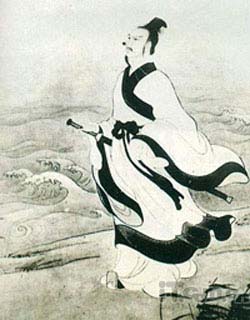
The origin of this summer festival centers around a scholarly government official named Chu Yuan. He was a good and respected man, but because of the misdeeds of jealous rivals he eventually fell into disfavor in the emperor's court。
Unable to regain the respect of the emperor, in his sorrow Chu Yuan threw himself into the Mi Low river. Because of their admiration for Chu Yuan, the local people living adjacent to the Mi Lo River rushed into their boats to search for him while throwing rice into the waters to appease the river dragons。Although they were unable to find Chu Yuan, their efforts are still commemorated today during the Dragon Boat Festival。
端午节,又称为五五节,因为端午节是在农历的五月五日,是三个重要的中国节庆之一,其他两个分别是中秋节和农历新年。
这个节日的由来是古代中国有一位博学多闻的官吏屈原,他是一位爱民而且又受到尊崇的官吏,但是由於一位充满嫉妒的官吏陷害,从此在朝廷中被皇帝所冷落。由於无法获得皇帝的重视,屈原在忧郁的情况下投汨罗江自尽。
由於对屈原的爱戴,汨罗江畔的居民匆忙的划船在江内寻找屈原,并且将米丢入汨罗江中,以平息汨罗江中的蛟龙。即使他们当时并没有找到屈原,但是他们的行为,直到今天在端午节的时候,仍然被人们传颂纪念著。
词汇:
1.lunar calendar农历
例句:The lunar calendar is different from the calendar used in the west. 农历和西方所用的历法不一样。
2.scholarly 博学多闻的(形容词)
例句:Our professor is very scholarly. 我们的教授非常博学多闻。
3.misdeed 罪行,不当的行为(名词)
例句:His misdeeds brought him bad fortune. 他不当的行为造成他悲惨的命运。
3.appease缓和、平息(动词)
例句:This food should appease his hunger。这些食物应该会让他感到比较不饥饿了。
4.commemorate庆祝、纪念(动词)
例句:On this day we commemorate those soldiers who died during battle。在这一天,我们纪念那些在战争中捐躯的军人。
风俗习惯
Dragon Boat race

Traditions At the center of this festival are the dragon boat races. Competing teams drive their colorful dragon boats forward to the rhythm of beating drums. These exciting races were inspired by the villager's valiant attempts to rescue Chu Yuan from the Mi Lo river. This tradition has remained unbroken for centuries。
端午节最重要的活动是龙舟竞赛,比赛的队伍在热烈的鼓声中划著他们多彩的龙舟前进。这项活动的灵感是来自於当时汨罗江畔的居民,在江中划船救屈原,而这个传统也一直保持了数个世纪。
Tzung Tzu

A very popular dish during the Dragon Boat festival is tzung tzu. This tasty dish consists of rice dumplings with meat, peanut, egg yolk, or other fillings wrapped in bamboo leaves. The tradition of tzung tzu is meant to remind us of the village fishermen scattering rice across the water of the Mi Low river in order to appease the river dragons so that they would not devour Chu Yuan。
在端午节时受欢迎的食物就是粽子,粽子是以米包著肉、花生、蛋黄及其他材料,再以竹叶包裹。而粽子的传统则来由於汨罗江边的渔夫,将米丢入江中平息江中的蛟龙,希望他们不要将屈原吃掉。
Ay Taso

The time of year of the Dragon Boat Festival, the fifth lunar moon, has more significance than just the story of Chu Yuan. Many Chinese consider this time of year an especially dangerous time when extra efforts must be made to protect their family from illness. Families will hang various herbs, called Ay Tsao, on their door for protection. The drinking of realgar wine is thought to remove poisons from the body. Hsiang Bao are also worn. These sachets contain various fragrant medicinal herbs thought to protect the wearer from illness。
农历的五月,也就是端午节的这个时节,对中国人而言,除了屈原的故事还有许多其他重要的意义。许多中国人相信五月是一年中容易引发疾病的危险时节,因此必须有许多防备家人生病的措施。许多家庭会将一种特别的植物-艾草挂在门口,作为保护之用,而人们也会挂带香包,它是以含有多种香味的药用植物所做成,也可以保护人们远离疾病。
词汇:
1.valiant英勇的
例句:The valiant hero saved the little girl's life。那个英勇的英雄拯救了小女孩的生命。
2.Tzung Tzu粽子
例句:He ate so much Tzung Tzu that he became sick。他因为吃太多粽子而感到身体不适。
3.wrap包裹
例句:She wrapped the Christmas presents with colorful paper。他用彩色的纸包裹圣诞礼物。
4.devour狼吞虎咽的吃,吃光
例句:The lion devoured the food。那只狮子狼吞虎咽的吃那些食物。
5.Ay Tsao艾草
例句:Every year my family hangs Ay Tsao on their front door。每年我的家人都会挂艾草在前门。
6.Hsiang Bao香包
例句:The children love to collect the colorful Hsiang Bao。小孩喜欢蒐集鲜艳的香包。
7.Realgar wine雄黄酒
例句:People drink realgar wine to protect themselves from illness。人们喝雄黄酒保护自己免於生病。
8.sachet香包、香袋
例句:The sachets are very fragrant。那些香包很香。
视频新闻
China prepares for Dragon Boat Festival
The whole country is in a festive mood, as this year's Dragon Boat Festival draws nearer. The festival falls on the fifth day of the fifth lunar month, to commemorate a patriotic poet who lived more than 2,000 years ago. This year the festival falls on Thursday.
Dragon boat races are the most exciting part of the festival.
In the southern city of Zhuhai, a competition even attracts teams from abroad.
Altogether, more than 400 athletes competed in the race.
And in the coastal city of Xiamen, this race is between teams from each side of the Taiwan Straits, bring extra meaning to the competition.
Taiwan team leader said, "We've been actively participating in sports competitions between two sides of the Straits. Through that, I think communications between us can become closer."
There are more in other places of the country. All of them are drawing crowds of spectators.
Besides the sweaty celebrations, people will mark the festival with other traditions.
That include making sachets, and eating rice dumplings.
Rice dumplings with fancy packaging used to be popular gifts during the festival.
But this year, those costing several hundred yuan are attracting few customers. Some haven't even made it to the supermarket shelves.
Work of Hebei Jinyuan Supermarket said, "Such rice dumplings wouldn't make a profit in short term, so we didn't have them. "
When it comes to traditional festivals like the Dragon Boat Fesival, for many, the original meaning and spirit of the celebration is the most important thing to remember.
端午节习俗介绍
The Dragon Boat Festival, the 5th day of the 5th lunar month, has had a history of more than 2,000 years. It is usually in June in the Gregorian calendar.端午节(农历五月初五)是中国古老的传统节日,始于春秋战国时期,至今已有2000多年历史。通常在阳历的六月份。
端午节吃什么?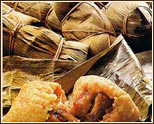
“粽包分两髻,艾束著危冠。旧俗方储药,羸躯亦点丹。”端午节不可不吃的美味食物就是tsung-tse(粽子),这种传统源于汨罗江边的渔夫,将米丢入江中平息江中的蛟龙,希望它们不要伤害屈原。
粽子tsung-tse:Glutinous rice(糯米) filled with meat, nuts or bean paste(豆酱) and wrapped in bamboo leaves. It is associated with Dragon Boat Festival with historical meaning.The custom of eating tsung-tse is also popular in North and South Korea, Japan and Southeast Asian nations.
端午节喝什么?
“樱桃桑椹与菖蒲,更买雄黄酒一壶。”端午节尝试一下雄黄酒吧。端午节这天,人们把雄黄倒入酒中饮用,并把雄黄酒涂在小孩儿的耳、鼻、额头、手、足等处,希望这样可以使孩子们不受蛇虫的伤害。
Adults drink realgar wine, which can fend off evil spirits.
端午节玩什么? 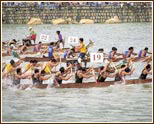 “鼓声三下红旗开,两龙跃出浮水来。棹影斡波飞万剑,鼓声劈浪鸣千雷。”端午节最应景的节目就是赛龙舟。
“鼓声三下红旗开,两龙跃出浮水来。棹影斡波飞万剑,鼓声劈浪鸣千雷。”端午节最应景的节目就是赛龙舟。
Dragon boat racing is an indispensable part of the festival, held all over the country. As the gun is fired, people will see racers in dragon-shaped canoes pulling the oars harmoniously and hurriedly, accompanied by rapid drums, speeding toward their destination.
端午节戴什么?
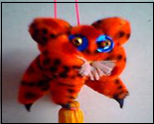 端午节最有特色的饰物就是香包(sachet)。小孩佩戴香包,传说有避邪驱瘟之意。用含有多种香味的药用植物做成的香包也可以预防疾病。
端午节最有特色的饰物就是香包(sachet)。小孩佩戴香包,传说有避邪驱瘟之意。用含有多种香味的药用植物做成的香包也可以预防疾病。
On Dragon Boat Festival, parents also need to dress their children up with a sachet. They first sew little bags with colorful silk cloth, then fill the bags with perfumes or herbal medicines(草药), and finally string them with silk threads. The sachet will be hung around the neck or tied to the front of a garment as an ornament. They are said to be able to ward off evil.
端午节挂什么?
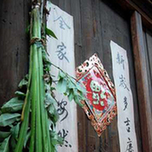 “不效艾符趋习俗,但祈蒲酒话升平。”
“不效艾符趋习俗,但祈蒲酒话升平。”
许多人相信五月是一年中容易引发疾病的危险时节,因此必须有许多防备家人生病的措施。端午节时,人们会将一种特别的植物-艾草挂在门口,作为保护之用。
在门上挂艾叶和菖蒲hang branches of moxa and calamus around the doors of their homes 和悬钟馗像display portraits of evil's nemesis, Chung Kuei都是为了驱疾避凶,讨个吉利。


